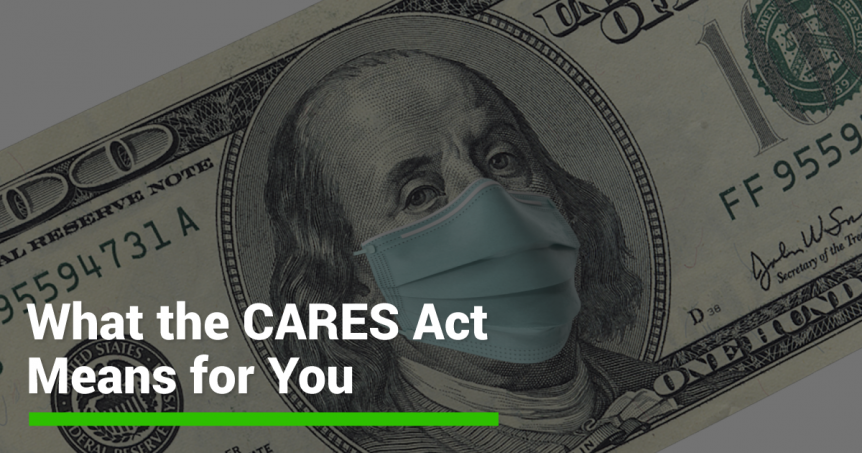The ongoing coronavirus pandemic has had a series of adverse side effects that have sent shockwaves through the world economy. To attempt to mitigate the economic fallout from the crisis, Congress passed the Coronavirus Aid, Relief, and Economic Security or CARES Act on March 26th.
The CARES Act includes several provisions aimed at helping different subsections of Americans. Let’s take a few moments to review the most prominent of these provisions and determine which benefits are most relevant to you.
Cash Stimulus for Taxpayers
Probably the most prominent of the Act’s provisions is a cash stimulus to be paid to Americans, which will vary based on their income. Most Americans who are single-filers and who make $75,000 or less per year will receive a one-time payment of $1,200 from the Act. Married couples will each receive separate checks, and families will receive an additional $500 per child. So, for example, a married couple with two children can expect to receive a total of $3,400 from the Act’s provisions.
After $75,000 in income has been exceeded by a single-filer (or $150,000 for a married couple filing jointly) the amount of the payment received will begin to phase out until reaching $99,000 in income (or $198,000) above which the taxpayer(s) will receive no payment.
The payments will be based on a filer’s 2018 or 2019 tax returns. Notably, retirees who are receiving social security benefits but do not file tax returns are still eligible to receive benefits from the stimulus. They will not need to file a tax return, as the Social Security Administration will determine their checks from the information they have on the individual(s).
Additional Unemployment Benefits
The CARES Act provides for an additional $600 in federal unemployment benefits on top of the base benefits that a claimant receives from his or her state of residence. At this time, that extra benefit will last for a total of four months. Additionally, the Act includes an additional 13 weeks of eligibility for unemployment, above and beyond the maximum that is offered by the individual state.
The Act also expands the types of individuals who are eligible to receive benefits. This is done primarily to make those who are self-employed, or who are independent contractors (so-called “gig economy” workers), eligible for unemployment where they would otherwise not be.
Tax Deadline Extension
The CARES Act extends the deadline to file one’s tax return for 2019 from the regular April 15th date to July 15th. Anyone who files by the new date, which is owed a refund by the government, can still expect to receive one.
No Required Minimum Distributions for 2020
The CARES Act suspends the need to take required minimum distributions (RMDs) from retirement accounts in 2020. Historically, owners of retirement accounts were required to start taking distributions from their accounts when reaching a certain age. In the past, this was age 70.5.
But, at the end of 2019, Congress passed the SECURE Act increasing this age to 72 years, which was set to begin with this tax year.
Any account owner who has already taken a distribution to satisfy RMD requirements in 2020 is eligible to roll the distribution back into the account within 60 days of it being taken. If more than 60 days have elapsed since the distribution, the account owner will have to request a waiver to roll back the funds. Inherited IRA beneficiaries are not eligible to roll funds back into the account.
Please note that this does not mean you cannot take any distributions from the account if you are in need, or if you desire to do so. You may make an appropriate withdrawal at any time. Just keep in mind that, as with distributions in previous years, there will be withholdings from the distributions for federal and any applicable state taxes.
Increased Deductions for Charitable Contributions
The CARES Act contains provisions aiming to increase the amount of charitable contributions made to qualifying organizations. To that end, several changes to standard tax laws have been included for the 2020 tax year.
When a filer itemizes their tax return (as opposed to taking the standard deduction), they normally have a limit on the amount of deduction they can take for cash contributions to charity. The limit is typically 60% of their adjusted gross income (AGI) for that tax year. Any excess contributions can usually be carried over for up to five subsequent years and applied to those returns where warranted.
The CARES Act increases this limit to 100% of AGI, which is intended to increase charitable giving. Additionally, filers who utilize the standard deduction are now eligible for up to $300 in an “above the line” deduction on their returns; this is in addition to the standard deduction.
Miscellaneous Provisions
The CARES Act also includes many various provisions that are geared more towards institutions and businesses rather than individuals. These include:
- Emergency grants and $350 billion in forgivable loans to small business owners to assist them in meeting financial needs while their businesses are disrupted.
- $58 billion in assistance to airlines to help them to operate.
- $100 billion in aid to hospitals and $20 billion earmarked for veterans’ health care.
- $8.8 billion in child nutrition assistance to public schools and $15.5 billion in Supplemental Nutritional Assistance Program (SNAP) benefits.
- Temporary relief through September 30th for all federally guaranteed student loans.
The coronavirus pandemic has caused an unprecedented disruption of American life. However, the CARES Act aims to soften the blow and to provide assistance to those in need until the crisis abates. Depending on the length of time that the crisis is ongoing, further legislation may be passed to continue to assist with the effects. If that should be the case, we will be certain to update you with any new changes that may have a direct impact on your life.







